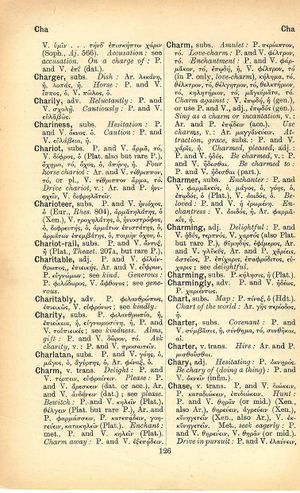charm: Difference between revisions
Ξένοισι πιστοῖς πιστὸς ὢν γίγνου φίλος → Amicus esto fidus in fidum hospitem → Erweise treuen Fremden dich als treuer Freund
m (Text replacement - "<b class="b2">and</b>" to "and") |
m (Woodhouse1 replacement) |
||
| Line 1: | Line 1: | ||
{{Woodhouse1 | {{Woodhouse1 | ||
|Text=[[File:woodhouse_126.jpg|thumb|link={{filepath:woodhouse_126.jpg}}]] | |Text=[[File:woodhouse_126.jpg|thumb|link={{filepath:woodhouse_126.jpg}}]] | ||
===verb transitive=== | |||
[[delight]]: [[prose|P.]] and [[verse|V.]] [[τέρπω]], [[τέρπειν]], [[εὐφραίνειν]]. | |||
[[please]]: [[prose|P.]] and [[verse|V.]] [[ἀρέσκειν]] (dat. or acc.), [[Aristophanes|Ar.]] and [[verse|V.]] [[ἁνδάνειν]] (dat.); see [[please]]. | |||
[[bewitch]]: [[prose|P.]] and [[verse|V.]] [[κηλεῖν]] ([[Plato]]), [[θέλγειν]] ([[Plato]] but rare [[prose|P.]]), [[Aristophanes|Ar.]] and [[prose|P.]] [[φαρμάσσειν]], [[prose|P.]] [[κατεπᾴδειν]], [[γοητεύειν]], [[κατακηλεῖν]] ([[Plato]]). | |||
[[enchant]]: Met., [[prose|P.]] and [[verse|V.]] [[κηλεῖν]] ([[Plato]]). | |||
[[charm away]]: [[prose|P.]] and [[verse|V.]] [[ἐξεπᾴδειν]]. | |||
===substantive=== | |||
[[amulet]]: [[prose|P.]] [[περίαπτον]], τό. | |||
[[love-charm]]: [[prose|P.]] and [[verse|V.]] [[φίλτρον]], τό. | |||
[[enchantment]]: [[prose|P.]] and [[verse|V.]] [[φάρμακον]], τό, [[ἐπῳδή]], ἡ, [[verse|V.]] [[φίλτρον]], τό (in [[prose|P.]] only, [[love-charm]]), [[κήλημα]], τό, [[θέλκτρον]], τό, [[θέλγητρον]], τό, [[θελκτήριος]] τό, [[κηλητήριον]], τό; [[μαγεύματα]], τά. | |||
[[charm against]]: [[verse|V.]] [[ἐπῳδή]], ἡ (gen.), or use [[prose|P.]] and [[verse|V.]], adj., [[ἐπῳδός]] (gen.). | |||
[[sing as a charm]] or [[sing as an incantation]], v.: [[Aristophanes|Ar.]] and [[prose|P.]] [[ἐπᾴδειν]] (acc.). | |||
[[use charms]], v.: [[Aristophanes|Ar.]] [[μαγγανεύειν]]. | |||
[[attraction]], [[grace]], subs.: [[prose|P.]] and [[verse|V.]] [[χάρις]], ἡ. | |||
[[charmed]], [[pleased]], adj.: [[prose|P.]] and [[verse|V.]] [[ἡδύς]]. | |||
[[be charmed]], v.: [[prose|P.]] and [[verse|V.]] [[ἥδεσθαι]]. | |||
[[be charmed to]]: [[prose|P.]] and [[verse|V.]] [[ἥδεσθαι]] (part.). | |||
}} | }} | ||
Revision as of 08:50, 20 May 2020
English > Greek (Woodhouse)
verb transitive
delight: P. and V. τέρπω, τέρπειν, εὐφραίνειν.
please: P. and V. ἀρέσκειν (dat. or acc.), Ar. and V. ἁνδάνειν (dat.); see please.
bewitch: P. and V. κηλεῖν (Plato), θέλγειν (Plato but rare P.), Ar. and P. φαρμάσσειν, P. κατεπᾴδειν, γοητεύειν, κατακηλεῖν (Plato).
enchant: Met., P. and V. κηλεῖν (Plato).
charm away: P. and V. ἐξεπᾴδειν.
substantive
love-charm: P. and V. φίλτρον, τό.
enchantment: P. and V. φάρμακον, τό, ἐπῳδή, ἡ, V. φίλτρον, τό (in P. only, love-charm), κήλημα, τό, θέλκτρον, τό, θέλγητρον, τό, θελκτήριος τό, κηλητήριον, τό; μαγεύματα, τά.
charm against: V. ἐπῳδή, ἡ (gen.), or use P. and V., adj., ἐπῳδός (gen.).
sing as a charm or sing as an incantation, v.: Ar. and P. ἐπᾴδειν (acc.).
use charms, v.: Ar. μαγγανεύειν.
attraction, grace, subs.: P. and V. χάρις, ἡ.
charmed, pleased, adj.: P. and V. ἡδύς.
be charmed, v.: P. and V. ἥδεσθαι.
be charmed to: P. and V. ἥδεσθαι (part.).

